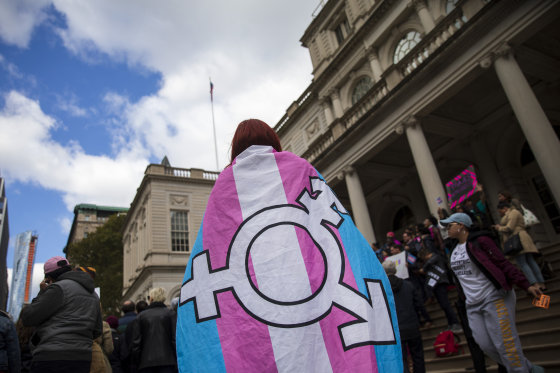Transgender adults may be more likely to have unhealthy habits and medical issues that negatively impact their quality of life than people whose gender identity matches what it says on their birth certificates, a U.S. study suggests.
Researchers examined survey data from 3,075 transgender adults as well as 719,567 adults who are cisgender, meaning their gender identity matches the sex they were assigned at birth.
Compared to cisgender Americans, transgender individuals were more likely to be sedentary, current smokers, and uninsured, researchers report in JAMA Internal Medicine.
Transgender people were also 30 percent more likely to report being in “fair” or “poor” health over the past month than cisgender adults, as well as 66 percent more likely to report experiencing severe mental distress.
“The U.S. has made a lot of progress over the last several years toward acceptance and celebration of natural human diversity in gender identity and expression,” study author Kellan Baker said by email. But between 2014 and 2017 - the period when the survey was done - attitudes shifted and treatment of transgender often got worse, said Baker, a researcher at the Johns Hopkins Bloomberg School of Public Health in Baltimore.
“This study shows that being a transgender person in the U.S. today - being transgender in a society that you know doesn’t fully accept you - is hard,” Baker added. “It affects your health in negative ways, and that’s why issues such as nondiscrimination protections for transgender people are public health issues.”
An estimated 0.55 percent of the people in the survey identified as transgender, which suggests there may be about 1.27 million transgender adults in the U.S.
Survey participants were asked if they considered themselves transgender and were given four options to categorize their identities: trans male (people who identify as male but were assigned female at birth); trans female (individuals who identify as female but were assigned male at birth); gender non-conforming; or not transgender.
Overall, about 19 percent of transgender respondents were current smokers, compared with roughly 16 percent of cisgender people.
About 35 percent of transgender individuals were inactive, compared with nearly 26 percent of cisgender adults.
And, almost 80 percent of transgender participants had health insurance, compared with 85 percent of other people in the study.
Transgender adults also reported more days in the previous month when they felt physically and mentally unhealthy or felt unable to do all of their usual daily activities.
The study wasn’t a controlled experiment designed to prove whether or how gender identity might directly impact health. Another limitation is that researchers lacked data on how differences within the transgender population such as gender, race and sexual orientation might influence the results.
“I think the take-home message for transgender adults here is clear, which is that transgender adults face additional mental and physical health disparities when compared to cisgender individuals,” said Xiang Cai, a researcher at the Columbia University Mailman School of Public Health in New York City who wasn’t involved in the study.
Cai attributes the higher risks for poor health in trans people to “multiple levels of transgender-specific stigmas.”
“However, I think it is important to note that adults in the transgender community are capable and resilient,” Cai said by email.
The study also didn’t look at whether transgender individuals had gender-affirming surgery or were able to make their outward appearance match their gender identity, Cai said.
“Gender-affirmation treatments may be associated with higher levels of quality of life among those who desire them regardless of age,” Cai noted.



